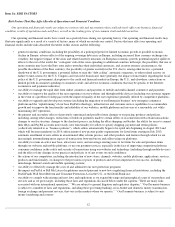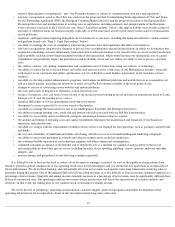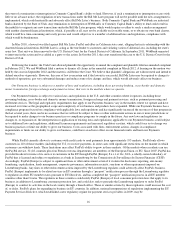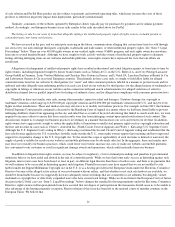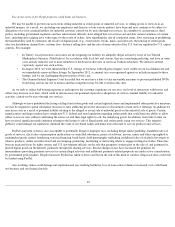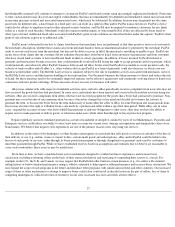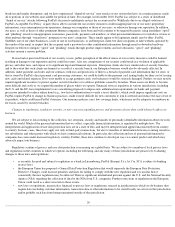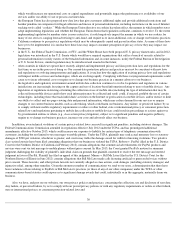eBay 2013 Annual Report Download - page 24
Download and view the complete annual report
Please find page 24 of the 2013 eBay annual report below. You can navigate through the pages in the report by either clicking on the pages listed below, or by using the keyword search tool below to find specific information within the annual report.
the legal climate, especially in Europe, is becoming more adverse to our positions, which may require us to take actions which could lower our
revenues, increase our costs, or make our websites and mobile platforms less convenient to our customers, which could materially harm our
business. In certain emerging markets, the government may be less experienced in dealing with online or mobile commerce and/or hosting
immunity protections may be more limited or not available at all. In addition, public perception that counterfeit or pirated items are
commonplace on our websites, even if factually incorrect, would damage our reputation, lower the price our sellers receive for their items and
damage our business.
We are continuously seeking to improve and modify our efforts to eliminate counterfeit and pirated items through ongoing business
initiatives designed to reduce bad buyer experiences and improve customer satisfaction and by responding to new patterns we are seeing among
counterfeiters and others committing fraud on our users. Increased intermediation of transactions between buyers and sellers, which we generally
refer to as our managed marketplace initiatives, intended to achieve those goals may result in us being unable to rely, to the same extent that we
have in the past, on hosting immunity and other secondary liability safe harbors when sued by users and rights owners over actions taken on our
site by our users. While we are taking steps to mitigate the potential impact on our safe harbor defenses, we may be subject to more intellectual
property litigation and may lose more cases as a result of these business model changes, which would adversely affect our business and results of
operations.
Content owners and other intellectual property rights owners may also seek to bring legal action against entities that are peripherally
involved in the sale of infringing items, such as payment companies. To the extent that intellectual property rights owners bring legal action
against PayPal based upon the use of PayPal's payment services in a transaction involving the sale of infringing items, including on our websites
or mobile platforms, our business could be harmed. Several jurisdictions have adopted new laws in these areas, and others are considering
imposing additional restrictions.
In addition, new laws have been proposed regulating ecommerce companies with respect to intellectual property issues. For example,
ACTA and TPP are trade agreements that include international standards for enforcing intellectual property rights, including provisions
regarding counterfeit goods and online piracy. The European Commission is considering revising the Intellectual Property Enforcement
Directive, which could potentially increase our exposure to enforcement actions from rights owners. Implementation of these or similar laws
could require us to change our business practices, increase our compliance costs and harm our business. Rights owners have also increasingly
gone into U.S. courts and obtained injunctions requiring PayPal to cease handling transactions for named websites and third parties (in most
cases located outside the U.S.) and to hold the funds of such parties pending judicial resolution of such rights owners' claims against such parties,
which disrupts the relationship between PayPal and such parties and, if such parties sell on our Marketplaces platforms, could also adversely
affect our Marketplaces business.
We are subject to patent litigation.
We have repeatedly been sued for allegedly infringing other parties' patents. We are a defendant in a number of patent suits and have been
notified of several other potential patent disputes. We expect that we will increasingly be subject to patent infringement claims involving various
aspects of our Marketplaces, Payments and Enterprise segments as:
Such claims may be brought directly against us, any of our companies and/or against our customers, including PayPal merchants and
Enterprise clients, whom we may indemnify either because we are contractually obligated to do so or as a business matter. We believe that an
increasing number of these claims against us and other technology companies have been, and continue to be, initiated by third parties whose sole
or primary business is to assert such claims. In addition, we have seen significant patent disputes between operating companies in some
technology industries (e.g., mobile telephony). Patent claims, whether meritorious or not, are time consuming and costly to defend and resolve,
and could require us to make expensive changes in our methods of doing business, enter into costly royalty or licensing agreements, or cease
conducting certain operations, which would harm our business.
22
•
our products and services continue to expand in scope and complexity (e.g., our mobile, local, social and digital initiatives);
•
we expand into new businesses, including through acquisitions; and
• the universe of patent owners who may claim that we, companies that we have acquired, or our customers (including PayPal
merchants and Enterprise clients) infringe their patents and the aggregate number of patents controlled by such patent owners
correspondingly increases.


